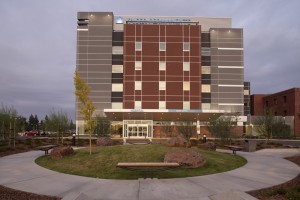As many as 16 third-year students in the Drexel University College of Medicine will have the opportunity to begin clinical rotations with Kaiser Permanente, a California-based healthcare provider, beginning July 2013.
Kaiser Permanente has medical centers located in nine states and the District of Columbia. It is the largest nonprofit healthcare provider in the United States. Drexel students will be assigned to medical centers located in South Sacramento, Roseville and Vallejo, Calif. As per the traditional third-year curriculum, rotations in these medical centers will focus on pediatrics, obstetrics and gynecology, surgery, outpatient psychiatry, family medicine, and adult medicine.
Dr. Barbara Schindler, DUCoM vice dean for educational and academic affairs, is working closely with Kaiser Permanente physicians, notably Dr. Lisa Liu, assistant physician-in-chief of health promotion and physician coordinator at the South Sacramento facility. Both Schindler and Liu believe the partnership will be mutually beneficial.
“We recognize that we need to be able to train the future workforce, and there’s going to be a need for more physicians, especially as we are aging. … We need primary-care doctors and are always eager to do whatever we can to train or influence potential physicians,” Liu said.
“[Students are] going to see a well-integrated health care system, and hopefully they’ll become leaders in providing, too. … It’s not just to have more students know about this type of system but to participate in it,” Schindler added.
Often, surgeries can be performed in safe environments outside of a hospital. With a strong outpatient medical program, “students will get to see practice in a different light. … They will understand what it means to practice based on evidence and give appropriate care in the right venue,” Liu said.
As an integrated health care delivery system, Kaiser Permanente has been cited as a model system for the future. Liu explained that in an integrated system, the health care provider is also the insurance carrier.
“Most companies consult with multiple hospitals and medical groups, but we are one united front. Our incentive is to make sure we take the very best care of our patients,” Liu said.
Kaiser Permanente takes pride in its efficient patient care and works hard to keep patients out of the hospital. Efficient practices extend beyond the integrated relationship between insurance carriers and health care providers. Kaiser has a robust, comprehensive electronic recordkeeping system. The system is more than digital documentation; it centralizes every interaction patients have had with their physicians at any location. This includes allergy records, lab tests, X-rays, electrocardiograms, emails, etc. Liu gives the example that if a patient was at another hospital and received a medicine to which he or she may have reacted poorly, his or her primary-care doctor would be able to access the entire file immediately and find out what the medicine was.
Additionally, rather than shuffle patients from one specialist to another, if a Kaiser Permanente patient meets with a primary-care doctor who identifies a problem that would require the expertise of a specialist, the primary-care doctor can easily make an appointment with a specialist for proper treatment. The doctors could simultaneously review the file, and the primary-care doctor and the patient may even video-chat with the specialist, or the primary-care doctor may send a high-quality image to the specialist for more information.
While the recent partnership is undoubtedly unique for third-year medical students at Drexel , it is not the first between the two institutions. In March 2011 Drexel partnered with Kaiser Permanente to be included in the Interdepartmental Medical Science program. The program is one of a kind. It’s designed for students to improve their science GPA and MCAT scores and become exposed to a medical-school setting before making the decision to apply to medical school. Drexel students are given the opportunity to improve their credentials by working with graduate students or medical students and shadowing doctors in a clinical setting. From the start of this program in 2011, Drexel students have been able to shadow Kaiser Permanente doctors, which fostered discussion for a partnership of clinical student rotations.
Kaiser Permanente also has experience offering shadowing, clinical rotations and residencies with other medical schools. Liu assured that Kaiser Permanente is well prepared to welcome Drexel students in July.



